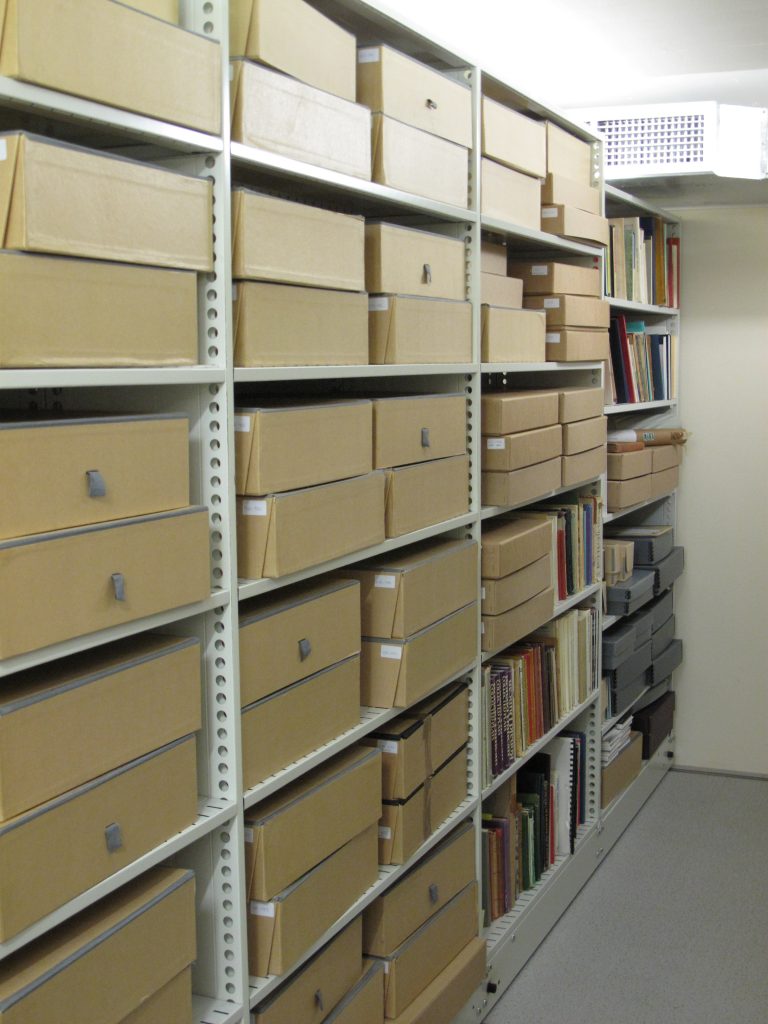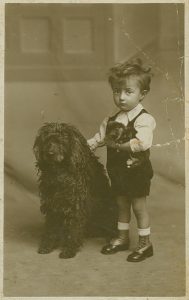
Part of the Ronald Duncan Collection
Hello Readers!
2017 is shaping up to be an exciting year for the University of Exeter Special Collections Team. We have two interesting projects taking place, thanks to generous funding and we’re taking to social media to keep you all up to date on them. You can read my colleague Annie’s introduction to the Syon Abbey cataloguing project here.
I’m lucky enough to be working as Project Archivist on the Ronald Duncan Collection as part of an 18-month project to catalogue and improve access to this fascinating collection. You can follow the progress of the project through this blog and also through @UoEHeritageColl on twitter.
The archive was permanently acquired from the Ronald Duncan Literary Foundation in 2012, having previously been on loan for a number of years, and the foundation has now generously funded this project to ensure that the collection is accessible for future researchers. In addition to being a full resource on the life of a West Country writer, the archive is a treasure trove of material on literary, musical and stage culture from the 1930’s. Its contents include material relating to many notable figures of the day, including: Gandhi, Ezra Pound, T.S. Elliot, Jacob Epstein and George Devine. It covers topics ranging from Politics to Self-Sufficiency, and also holds material relating to Rose Marie Duncan (nee Hansom), Ronald Duncan’s wife and a talented artist in her own right.
In his first Autobiography ‘All Men Are Islands’ (1964) Duncan writes:
‘When the present is interesting we do not bother with the past. We try to remember only when we’ve lost the vitality of doing anything worth remembering. The past is a wastepaper basket. We burrow into it only when we feel we have no future.’
Well, no offence to Duncan, but I disagree. I find the past every bit as exciting as the present and I hope that you will continue to join me as I delve into Ronald Duncan’s ‘wastepaper basket’
A short biography of Ronald Frederick Henry Duncan (6 August 1914 – 3 June 1982)

Ronald Duncan as a child
Born in 1914 in Salisbury, Rhodesia (now Harare, Zimbabwe), Duncan spent his early life in London before reading English at Cambridge under F.R. Leavis. An interest in pacifism led him to write the manifesto for the Peace Pledge Union and sparked an invitation to visit Gandhi at his Wardha Ashram in 1937. Later settling in Devon, Duncan ran a community farm at West Mill, Bideford during WWII and entertained notable figures of the day; including Benjamin Britten, Virginia Maskell, and Lord Harewood. His work on the Exeter Taw and Torridge Festival led to the establishment of the Royal Court Theatre in 1956.
Duncan’s career spanned stage and screen, with over 25 plays to his name, including ‘Abelard and Heloise’, ‘This Way to the Tomb’ and ‘Don Juan’. In 1968 Duncan scripted Jack Cardiff’s ‘Girl on a Motorcycle and in 1969 the BBC Drama Workshop released a ground-breaking vinyl record ‘The Seasons’, setting Duncan’s poems to music by David Cain. Though largely ignored at the time, this recording achieved cult status in the 1990’s and was reissued in 2012. He also had a prolific literary career, publishing several volumes of poetry and short stories in addition to three rather controversial autobiographies and a five-part epic scientific poem entitled ‘Man’. He is however, perhaps best known for the libretto in Benjamin Britten’s ‘Rape of Lucretia’ and for his poem ‘The Horse’, written for the National Horse Show.
In 1941 Duncan married Rose Marie Hansom, a talented illustrator, and the couple had two children. Duncan died in 1982, age 68, leaving a fascinating archive and the Ronald Duncan Literary Foundation (set up during his lifetime) as his lasting legacy.
More information on Ronald Duncan and his works can be found on the website of the Ronald Duncan Literary Foundation here
For more about the University of Exeter Heritage Collections click here, and to search the current list of the Ronald Duncan Archive click here
Thanks for the post – good to see this rare treasure of a Collection getting some promo!
Anna (Trustee Ronald Duncan Foundation)
Great to see this blog up and running – I will await more posts with interest. What a lovely first photo of him – like butter wouldn’t melt!